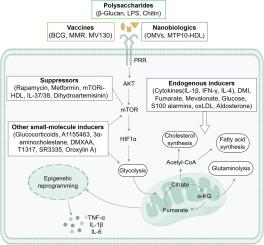Trained immunity modulators: A new frontier in immunoregulation and disease intervention
IF 13
1区 综合性期刊
Q1 MULTIDISCIPLINARY SCIENCES
引用次数: 0
Abstract
Background
Immunotherapy has emerged as one of the most revolutionary approaches in disease treatments. However, most current and emerging immunotherapeutic strategies primarily target the adaptive immune system. Recent studies have elucidated that innate immune myeloid cells can develop sustained phenotypic modifications upon exposure to specific immunomodulators, mediated through coordinated metabolic alterations and epigenetic reprogramming. These changes lead to either hyperresponsive or hyporesponsive innate immune cells when exposed to secondary stimuli, a phenomenon termed “trained immunity”. Over the past decade, trained immunity has garnered increasing attention for its potential to enhance host defense. While numerous studies have investigated trained immunity modulators, comprehensive reviews—especially those focusing on recently identified modulators—are still lacking.Aim of review
This review aims to elucidate the molecular mechanisms underlying trained immunity and its dual roles in various pathological conditions. We provide a comprehensive summary of the classifications and mechanisms of trained immunity inducers and suppressors identified in the past decade, emphasizing their therapeutic potential in immune-related diseases. Additionally, we discuss the limitations of these trained immunity modulators and offer insights into future directions for developing novel therapies targeting trained immunity.Key scientific concepts of review: This review first provide an overview of the molecular mechanisms underlying trained immunity, highlighting both its beneficial and detrimental effects on various diseases. Then it focuses on summarizing the classification and mechanisms of trained immunity modulators, including vaccines, polysaccharides, nanobiologics, endogenous mediators and other non-canonical modulators. Finally, the limitations of current trained immunity modulators and insights into future directions for developing novel therapies targeting trained immunity are proposed.

训练免疫调节剂:免疫调节和疾病干预的新前沿
免疫疗法已成为疾病治疗中最具革命性的方法之一。然而,大多数当前和新兴的免疫治疗策略主要针对适应性免疫系统。最近的研究表明,先天免疫髓细胞在暴露于特定免疫调节剂后,可以通过协调的代谢改变和表观遗传重编程来发展持续的表型改变。当暴露于二次刺激时,这些变化导致先天免疫细胞反应过度或反应不足,这种现象称为“训练免疫”。在过去十年中,训练免疫因其增强宿主防御的潜力而受到越来越多的关注。虽然有许多研究调查了训练有素的免疫调节剂,但仍然缺乏全面的评论,特别是那些关注最近发现的调节剂的研究。本文旨在阐明训练免疫的分子机制及其在各种病理条件下的双重作用。我们提供了一个全面的总结分类和训练免疫诱导剂和抑制在过去十年中发现的机制,强调他们在免疫相关疾病的治疗潜力。此外,我们讨论了这些训练免疫调节剂的局限性,并为未来开发针对训练免疫的新疗法提供了见解。综述的关键科学概念:本文首先概述了训练免疫的分子机制,强调了其对各种疾病的有益和有害作用。然后重点总结了训练免疫调节剂的分类和机制,包括疫苗、多糖、纳米生物、内源性介质和其他非典型调节剂。最后,提出了目前训练免疫调节剂的局限性,并对未来开发针对训练免疫的新疗法的方向提出了见解。
本文章由计算机程序翻译,如有差异,请以英文原文为准。
求助全文
约1分钟内获得全文
求助全文
来源期刊

Journal of Advanced Research
Multidisciplinary-Multidisciplinary
CiteScore
21.60
自引率
0.90%
发文量
280
审稿时长
12 weeks
期刊介绍:
Journal of Advanced Research (J. Adv. Res.) is an applied/natural sciences, peer-reviewed journal that focuses on interdisciplinary research. The journal aims to contribute to applied research and knowledge worldwide through the publication of original and high-quality research articles in the fields of Medicine, Pharmaceutical Sciences, Dentistry, Physical Therapy, Veterinary Medicine, and Basic and Biological Sciences.
The following abstracting and indexing services cover the Journal of Advanced Research: PubMed/Medline, Essential Science Indicators, Web of Science, Scopus, PubMed Central, PubMed, Science Citation Index Expanded, Directory of Open Access Journals (DOAJ), and INSPEC.
 求助内容:
求助内容: 应助结果提醒方式:
应助结果提醒方式:


